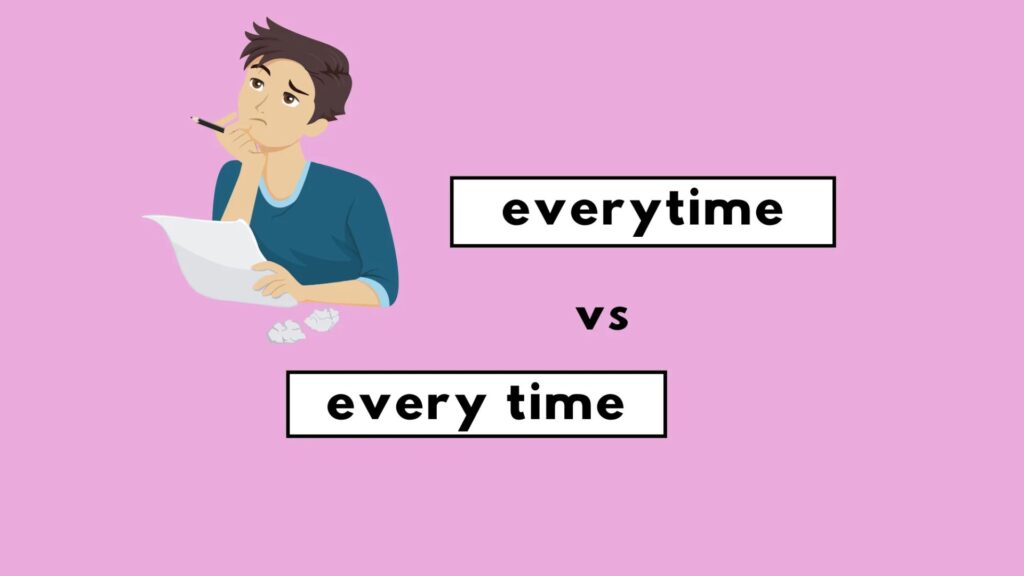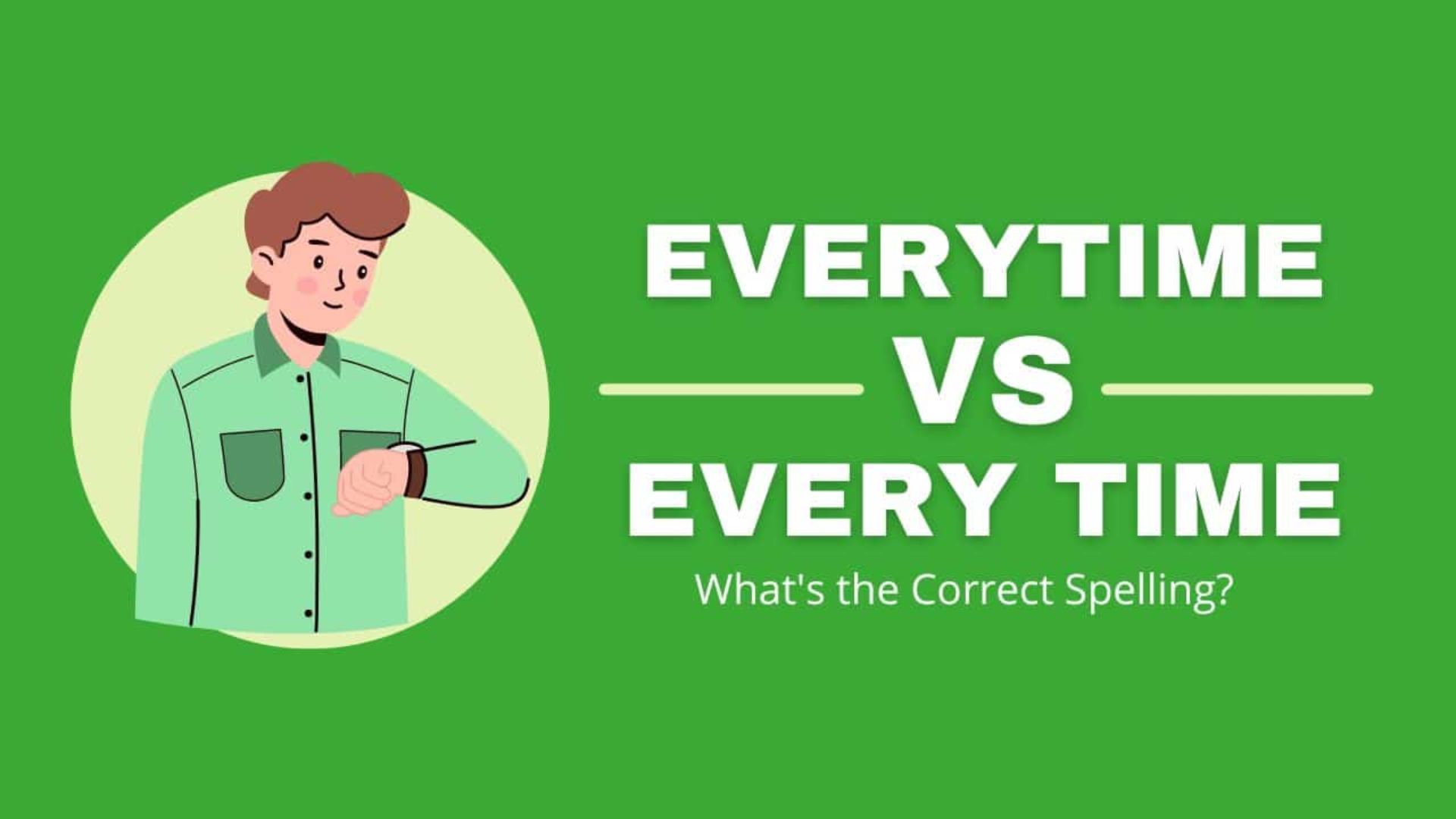You’re typing out a quick message or maybe polishing a professional email and you hesitate. Is it “every time” or “everytime”? You’ve seen both. But which one is actually correct?
Spoiler alert: only “every time” is grammatically correct in formal writing.
Let’s dive into the difference, why it matters, and how you can stop second-guessing yourself every time you write it.
What’s the Meaning of “Every Time”?

Simply put, “every time” means on each occasion or whenever something happens. It’s made up of two words:
- “Every” = all, taken one by one
- “Time” = an instance or occasion
Put them together and you get:
Every time = “each instance something occurs”
✅ Example Sentences:
- Every time I drink coffee after 9 p.m., I can’t sleep.
- That song makes me cry every time I hear it.
- She forgets her ID every time we go out.
So… Is “Everytime” a Word?
Nope “everytime” is not a correct word in standard English. It’s a common spelling error, often made in texting or informal conversation, but it’s not recognized by most dictionaries.
📚 Dictionary Definition:
Merriam-Webster and Oxford English Dictionary do not list “everytime” as a valid word. If you type it in Microsoft Word or Google Docs, you’ll likely see a red squiggly underline.
🚫 Examples of Incorrect Use:
- I get nervous everytime I speak in public. ❌
- That joke gets me everytime. ❌
Instead, both should be:
- I get nervous every time I speak in public. ✅
- That joke gets me every time. ✅
Why People Confuse “Every Time” and “Everytime”

The confusion stems from other words that have evolved into compound forms over time.
Think about:
- Everyday (adj.) vs Every day (time expression)
- Anytime vs Any time
- Alright vs All right
- Nevermind vs Never mind
These are all commonly confused English compounds, and just like them, “every time” gets mistakenly collapsed into one.
However, “everytime” hasn’t yet made the leap into acceptability in formal usage.
Usage in Formal vs Informal Writing
✍️ In Formal Writing (Emails, Academic Papers, Reports):
Always use “every time” two words. No exceptions.
Example (Email):
Subject: Request for Schedule ChangeHi Ayesha,
Thank you for your help every time I need last-minute changes. I appreciate your flexibility.
Best,
Sarah
💬 In Informal Writing (Texts, Chats, Social Media):
You might see “everytime,” but it’s still technically incorrect.
Text Message (Incorrect):
“Ugh. I forget my password everytime 😩” ❌
Better:
“I forget my password every time 😩” ✅
So even in casual use, sticking with “every time” helps you stay grammatically on point.
Grammar Rules for “Every Time”
✅ Use “Every time” when:
- Referring to repeated actions
- Describing each occurrence of an event
- Starting or finishing a dependent clause
Examples:
- Every time I try to diet, someone brings cake.
- She laughs every time she hears that story.
- Every time we call the support line, no one answers.
Compound vs Phrase Distinction
This is where things get technical (but stay with me).
“Every time” is a phrase, not a compound word.
A compound word fuses multiple words into one new word like “notebook” or “sunflower.”
A phrase is a group of words that function together but are not joined.
So while “everytime” might look like a legitimate compound, it’s actually a confused compound a misspelling that hasn’t been accepted into standard grammar.
Visual Tip: Spotting “Every Time” in Context
Use a simple test:
Try inserting a word between “every” and “time.”
❓ Can you say: “every single time”?
✅ If yes → then it should be two words: every time
❌ If no → it might be a compound, like everyday (as in “everyday clothes”)
Common Grammar Mistakes
Let’s clear the fog on a few frequent mix-ups:
| Mistake | Correct Form | Why It’s Wrong |
|---|---|---|
| everytime | every time | “Everytime” isn’t a recognized word |
| everyday (meaning “each day”) | every day | “Everyday” is an adjective: “everyday shoes” |
| alright | all right | “Alright” is informal/slang; not for formal writing |
| anytime (incorrect in some contexts) | any time | “Anytime” is okay as an adverb, but not always interchangeable |
Synonyms for “Every Time”
Want to switch things up? Try these alternatives:
- Each time
- Whenever
- At any time
- Without fail
- No matter when
- Invariably
Example with Synonym:
Original: That movie gets me every time.
Alternate: That movie gets me whenever I watch it.
Scenario Example: Academic Usage
Formal Essay Excerpt:
“The experiment produced identical results every time it was repeated, suggesting a high level of reliability.”
Using “everytime” here would make the writing look unpolished and unprofessional.
Origin of “Every” and “Time”

Let’s nerd out for a second.
The word “every” traces back to Old English æfre ælc, which translates to “each of a group.”
So it literally breaks down to:
Every = all, considered one by one
Time = a single instance or occasion
No wonder the combination “every time” still feels natural today.
Quick Reference Table
| Usage | Correct Form | Example |
|---|---|---|
| Time-related frequency | Every time | “Every time I see her, she’s smiling.” |
| Compound form (incorrect) | Everytime ❌ | “I mess up everytime.” ❌ |
| Synonym | Each time | “Each time I call, it goes to voicemail.” |
| Informal shortcut (avoid) | Everytime ❌ | “Everytime I text, no reply.” ❌ |
Final Thoughts: When to Use Every Time
Use “every time” whenever (yep!) you’re referring to each instance something happens. It’s clean, correct, and fits all registers from casual chats to business proposals.
Avoid the tempting but incorrect compound “everytime.” Even if autocorrect doesn’t flag it, grammar checkers and eagle-eyed editors will.
So next time you hesitate, remember:
Every time = always two words. Without fail.

